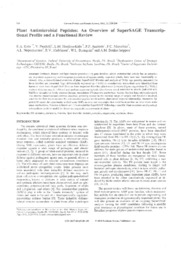Plant antimicrobial peptides: an overview of superSAGE transcriptional profile and a functional review.
Plant antimicrobial peptides: an overview of superSAGE transcriptional profile and a functional review.
Autoria: KIDO, E. A.; PANDOLFI, V.; HOULLOU-KIDO, L. M.; ANDRADE, F. C.; MARCELINO, F. C.; NEPOMUCENO, A. L.; ABDELNOOR, R. V.; BURNQUIST, W. L.; BENKO-ISEPPON, A. M.
Resumo: Defensin, thionin and lipid transfer protein (LTP) gene families, which antimicrobial activity has an attractive use in protein engineering and transgenic production of agronomically important plants, have been here functionally reviewed. Also, a transcriptional overview of plant SuperSAGE libraries and analysis of 26 bp tags possibly annotated for those families are presented. Tags differentially expressed (p < 0.05) or constitutively transcribed were identified from leaves or roots from SuperSAGE libraries from important Brazilian plant crops [cowpea (Vigna unguiculata (L.) Walp.), soybean (Glycine max (L.) Merr.) and modern sugarcane hybrids (Saccharum spp.)] submitted to abiotic [salt (100 mM NaCl) or drought] or biotic stresses [fungus inoculation (Phakopsora pachyrhizi; Asiatic Soybean Rust phytopathogen)]. The diverse transcriptional patterns observed, probably related to the variable range of targets and functions involved, could be the first step to unravel the antimicrobial peptide world and the plant stress response relationship. Moreover, SuperSAGE opens the opportunity to find some SNPs or even rare transcripts that could be important on plant stress resistance mechanisms. Putative defensin or LTPs revealed by SuperSAGE following a specific plant treatment or physiological condition could be useful for future use in genetic improvement of plants.
Ano de publicação: 2010
Tipo de publicação: Artigo de periódico
Unidade: Embrapa Soja
Palavras-chave: Biotecnologia, Cana de açúcar, Defensin, Expressão gênica, Feijão, Genoma, Lipid transfer protein, PR proteins, Soja, Stress, Thionin
Observações
1 - Por padrão são exibidas publicações dos últimos 20 anos. Para encontrar publicações mais antigas, configure o filtro ano de publicação, colocando o ano a partir do qual você deseja encontrar publicações. O filtro está na coluna da esquerda na busca acima.
2 - Para ler algumas publicações da Embrapa (apenas as que estão em formato ePub), é necessário ter, no celular ou computador, um desses softwares gratuitos. Sistemas Android: Google Play Livros; IOS: iBooks; Windows e Linux: software Calibre.
Acesse outras publicações
Acesse a Base de Dados da Pesquisa Agropecuária (BDPA) para consultar o acervo completo das bibliotecas da Embrapa.

